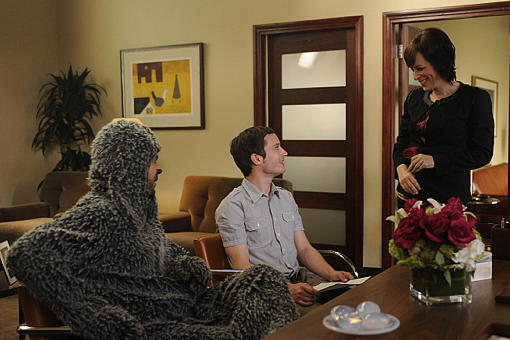By Matt Meier · August 11, 2011

“In general, pride is at the bottom of all great mistakes.” – Steven H. Coogler
You never really know a person until you’ve seen them at their most vulnerable, their most desperate. Home foreclosure and eviction, unemployment, failing marriages, terminal illness – how we choose to handle these predicaments reveals volumes about our inner-most selves.
For Ryan, like so many of us struggling to survive today’s perpetual economic decay, that source of desperation derives from his financial ruin. He left his job as a lawyer in the first episode in the wake of his existential crisis, but he has failed to obtain – or more accurately, failed to look at all – for a new choice of career ever since. His savings have run all but dry, and though his sister offers to lend him some cash to get by, Ryan’s pride forbids him from accepting her pity-laced charity. The real kicker comes when Wilfred causes Ryan to swerve into another vehicle, causing damages upward of $4200; but rather than pay the money, Wilfred observes that the woman is in fact quite desperate for some TLC – that’s tender loving care, not the outstanding ‘90s R&B trio (R.I.P. Left Eye) – and how far Ryan is willing to exploit that weakness in order to avoid the hefty payment he owes her forms the backbone of the episode.
Like many other episodes, “Pride” highlights Ryan and Wilfred’s relationship as the classic odd-couple comedy between the wimpish and the impish, respectively. But despite the trouble into which Wilfred constantly drags Ryan, Ryan fails to ever approach these predicaments with anything more than mundane trepidation, with Wilfred frequently acting on Ryan’s behalf when Ryan himself proves too timid and conservative to indulge in such disputable behavior. Of course in many instances Ryan’s resistance toward Wilfred’s disobedience forms the arc of the show, like in Week 3, which centered upon Ryan building up the courage to stand up to he rowdy neighbor.
In “Pride,” however, Ryan’s arc in handling his economic woes feels shortchanged – no pun intended – given the severity of the issue at hand.
This is another classic example of Wilfred being too restrained with Ryan’s character. Yes, he should be more conservative than Wilfred; but what fun is a conservative character who rarely exhibits any genuine change? It’s time the show stop worrying about using Ryan as a character to balance out Wilfred and start approaching him for the emotional wreck he truly is. Unemployed, failing love and social life, recently tried to commit suicide – these are not character traits that should be taken lightly, and it’s time that they allow Ryan to flourish in his own darkness and despair.
Let’s think back to Fight Club for a second. If you’ve seen it, you remember the point in the movie where Ed Norton’s character begins to take on many of the traits of Tyler Durden. He becomes more aggressive, more volatile, more defiant, more sardonic, and it’s truly a beautiful evolution. The biggest mistake that Wilfred seems to continuously make is allowing the characters to remain all but stagnant. “Pride” would have proven a much more potent episode had Ryan embraced the opportunity to become this woman’s boy toy in order to overcome his financial troubles rather than resist it every step of the way. He can either ask his sister for money or sleep with this woman who could support for him financially – either way, he must abandon some sense of pride in himself.
The show itself appears too attached to Ryan’s pride, afraid to let him wander into morally grey territory, or act in a way that may appear too synonymous with Wilfred’s debauchery. But at the end of the day, your lead protagonist should not be less interesting than your supporting role, and that will continue to be the case until the writers are willing to take as many risks with Ryan as they do with Wilfred every week.